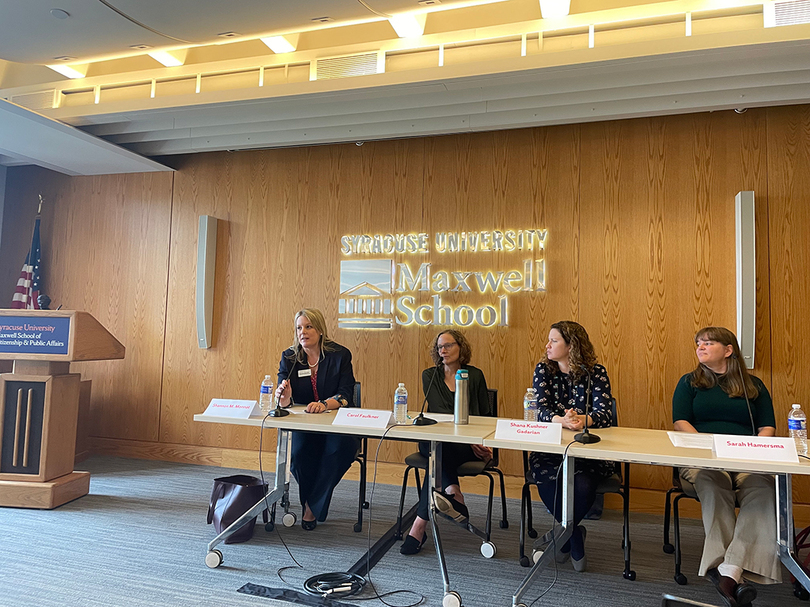Maxwell expert panel discuss implications, aftermath of Roe v. Wade overturn

The Wednesday evening discussion comprised a panel of five experts from the Maxwell School of Citizenship and Public Affairs in respective fields relevant to the U.S. Supreme Court’s overturn of Roe v. Wade. Jana Seal | Asst. News Editor
Get the latest Syracuse news delivered right to your inbox.
Subscribe to our newsletter here.
A panel of five professors in the Maxwell School of Citizenship and Public Affairs at Syracuse University discussed the overturning of Roe v. Wade and its aftermath at Eggers Hall on Wednesday evening.
The panel, “What’s at Stake Post Roe?: Implications of the Supreme Court’s Dobbs vs. Jackson Abortion Ruling” followed a virtual July 7 discussion panel with the same members. Maxwell faculty experts who specialize in fields related to the decision and its impacts spoke on implications relative to their respective areas of study.
Tom Keck, a political science professor who specializes in constitutional law and the United States Supreme Court, opened the panel with an explanation of the court’s logic and constitutional basis for the June 24 decision.
Justice Samuel Alito wrote in his opinion that abortion rights are not constitutionally protected because they are not explicitly guaranteed by the text’s literal wording, Keck explained. He added that each year he teaches a 1798 case in which the court says clearly that it will sometimes rule on the basis of fundamental principles that aren’t explicit in the Constitution.
“The basic logic of (this decision) is that if your rights were not constitutionally protected in the mid-19th century, they’re still not constitutionally protected today,” Keck said.
History professor Carol Faulkner addressed Alito’s argument that there isn’t a right to abortion “deeply rooted in the Nation’s history and tradition” with historical examples that contradict his notion. She said that before the mid-19th century, women treated a “missed period” by going to an apothecary and getting medicine.
Keck also explained the way “competing interest” is addressed in Roe v. Wade opposed to Alito’s argument in Dobbs v. Jackson, saying that while Roe emphasized striking a balance between a state’s interest in protecting fetal life and a person’s interest in reproductive autonomy, Dobbs disregarded the balance altogether.
“The court’s opinion in Dobbs gives weight to only one side of that scale, right on the current court’s view,” Keck said. “That side of the scale gets zero weight. The reproductive autonomy of the pregnant person gets zero weight in the court’s opinion.”
In line with a theory called the “thermostat of public opinion,” political science professor Shana Kushner Gadarian said that when policy moves too far to the right or to the left, the public will move in the other direction. Following the decision, she said, the public is more willing to say they’re pro-choice or take a position on the issue.
In special elections since the decision in places like Kansas and New York, she said, voter turnout has proven to be consistent with this trend.
“What we know moves people and motivates people (during) election time is either hope or anger, and we’re seeing a lot of anger. We’re seeing more registration among women voters,” Gadarian said.
The basic logic of (this decision) is that if your rights were not constitutionally protected in the mid-19th century, they're still not constitutionally protected today.Tom Keck, political science professor
Sarah Hamersma, a public affairs professor and economist, said around half the population is expected to see their nearest abortion care provider close, and that in corresponding areas, abortions are expected to decrease by 27%. Nationally, she said, abortions are expected to decrease by 9%.
Jenn M. Jackson, a professor in the political science department with research interest in Black politics and gender and sexuality, emphasized thinking about race in the long arc of slavery in the United States, and how it relates to the orientation to Western medicine.
Narratives around the way Black women experience pain and histories of gynecological experimentation on Black women have created a culture of distrust among Black people with respect to medical science, Jackson said. For Black, brown and Indigenous women, entering a hospital for reasons relating to pregnancy or anything having to do with gynecological needs has historically been a risk, she said.
Considering populations who are vulnerable when dealing with medical science and Western medicine, broadening the conversation is essential, Jackson said.
“As we continue to think about the legal constraints and structures and to think about the institutional implications and the electoral outcomes and the history here, I … want us to make sure that we’re also thinking about what it’s like to live in this moment on the ground with the actual lived experiences of folks, primarily working class and poor folks, who are the most affected by these decisions,” she said.
Hamersma emphasized the way people think about whether people have rights in a democracy depends on who’s assigned to have rights. With respect to surrounding questions of who votes and who the stakeholders in a democracy are, Jackson said she thinks of communities and groups like previously incarcerated people who have been witnessing their rights being rolled back for a long time.
“When I think democracy, I think for whom? To whom?” Jackson said. “We have to always provide a context for what we mean by and who we are applying the term to.”





